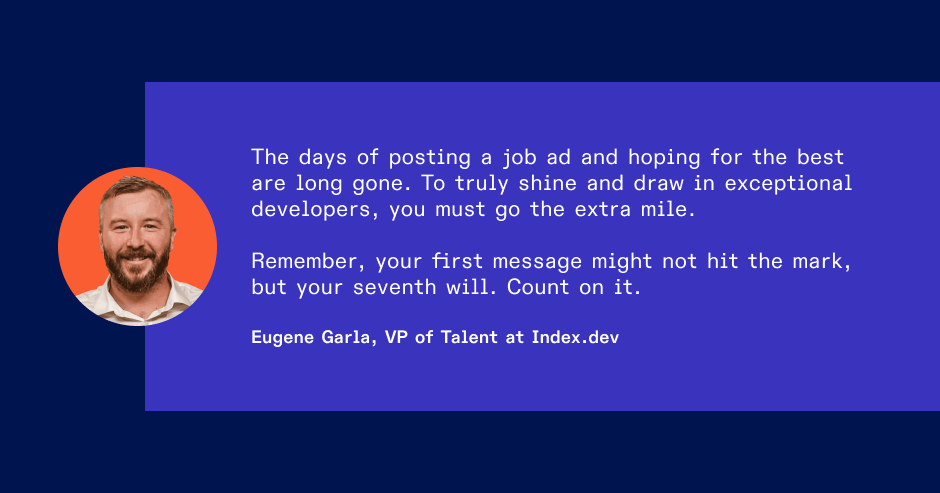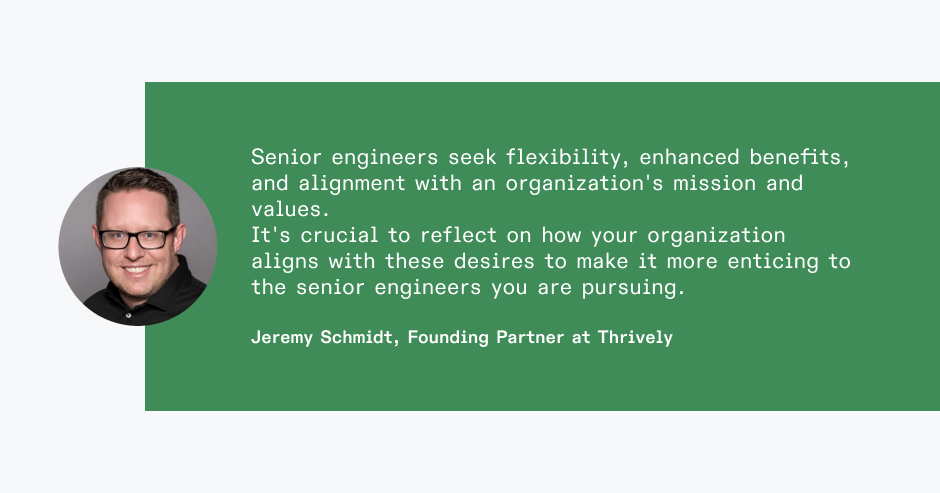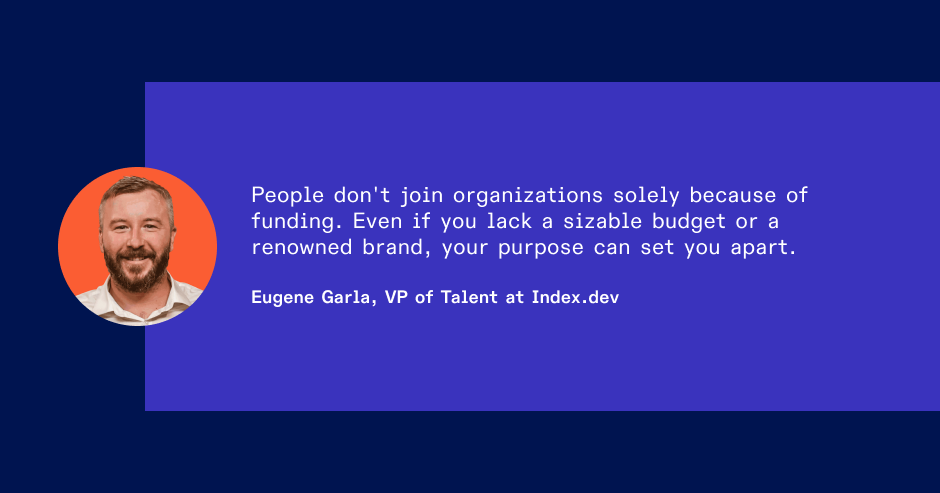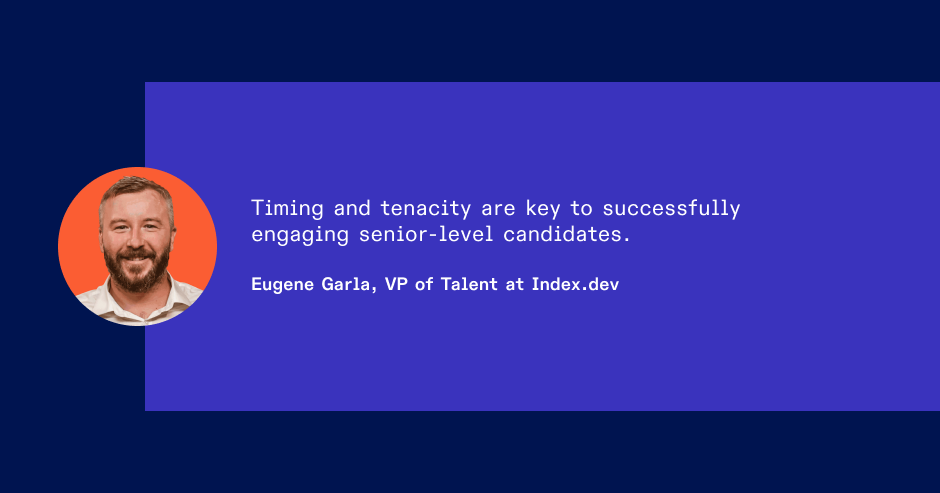
“The days of posting a job ad and hoping for the best are long gone. To truly shine and draw in exceptional developers, you must go the extra mile. Remember, your first message might not hit the mark, but your seventh will. Count on it.” - Eugene Garla, VP of Talent at Index.dev
It’s not hyperbolic to say that the success of a tech company hinges on its TA team’s ability to build scalable, efficient, and high-performing tech teams.
There are a finite number of top engineers and far too many companies trying to get their attention. If you want to get your hands on better candidates, you have to look where others aren't.
But where do you even start?
Recently, in the Codility webinar titled "How to Compete for Senior Engineers," seasoned recruiters and industry experts came together to explore strategies for attracting and retaining highly qualified senior engineers. This insightful discussion addressed concerns about job security and the appeal of new career opportunities, providing valuable insights into finding the right balance.
Moderated by Taylor Sullivan, Ph.D, from Codility, this webinar brought together two accomplished recruitment experts: Eugene Garla, VP of Index.dev and Jeremy Schmidt, founding partner at thrively. They not only discussed paradigm shifts transforming the tech hiring landscape but also shared their organizations’ practical experiences to iron out scalable hiring processes for the best tech talents out there.
Key topics covered in this session included:
- Strategies for attracting and retaining experienced senior engineers, even with limited resources in your hiring team.
- Navigating the remote work landscape: Balancing flexibility with team cohesion.
- The significance of technical assessments and hiring interviews.
- Learning from the common missteps in hiring tech talent, based on an analysis of Index.dev's 10,000 vetted interviews.
- Building relationships with passive candidates. Crafting creative sourcing approaches tailored to specific tech talent profiles.
- Streamlining technical workforce management and identifying leadership or mentorship opportunities for senior engineers.
Meet the Experts
Let's provide a more engaging and informative introduction to the panelists and the moderator:
Eugene Garla - VP of Talent at Index.dev
Eugene Garla serves as the VP of Talent at Index.dev, a remote work platform renowned for its ability to connect tech companies with senior engineering talent from regions including Central and Eastern Europe (CEE), the Balkans, Latin America, and the CIS. Eugene is deeply passionate about people, sourcing, technology, and possesses a wealth of knowledge in human resources (HR). Beyond that, he is a well-known consultant and mentor to startup founders, offering guidance on various areas, including screening, discovering hidden talent, and remote hiring. Eugene has also played a pivotal role in career events and HR automation, with a strong focus on recruitment powered by AI.
Jeremy Schmidt - Founding Partner at Thrively
Jeremy Schmidt serves as founding partner at Thrively, a specialized recruiting and consulting firm with a focus on the tech industry. With a distinguished career as a talent management leader, Jeremy brings a treasure trove of experience and innovation to the realm of human resources (HR). He has honed his skills in crafting global talent functions and building the essential infrastructure needed to facilitate the growth of organizations through the power of top-tier talent.
Taylor Sullivan, Ph.D - Senior Director of Product Insights & I/O Psychologist at Codility
Taylor Sullivan, Ph.D., plays a pivotal role at Codility. Codility is a leading tech hiring platform that helps businesses assess, manage, and train their engineering teams. Taylor's passion lies in bridging the realms of psychology, technology, and business to drive a positive impact in the field of talent selection and development. With over a decade of experience in the domain of Industrial-Organizational Psychology, she boasts a strong background in product development and research. Taylor's unique blend of expertise consistently delivers results, connecting people and ideas in fresh, innovative ways. As an experienced assessment scientist, her technical proficiency and customer-focused insights ensure that solutions align seamlessly with user needs, ultimately driving their desired outcomes.
Get matched with senior front-end developers by tapping into a pool of 10,000 pre-vetted tech talent profiles. Get started now →
What You Need to Know: 5 Key Takeaways From the Webinar

1. Know your value proposition
Jeremy highlighted the importance of introspection, open communication, and clear messaging to appeal to senior engineers. This included factors like understanding what the organization has to offer, such as its remote work policies, benefits, values, and tech stack.
“Prior to embarking on any tactical efforts to attract senior engineers, it's imperative to engage in self-reflection and contemplate what aspects of your organization make it appealing. This includes addressing key factors upfront, such as your remote work policy – whether you offer full remote, a hybrid model, or require in-office presence. It's essential to be transparent from the outset, avoiding any attempts to conceal these details. Senior engineers seek flexibility, enhanced benefits, and alignment with an organization's mission and values. It's crucial to reflect on how your organization aligns with these desires to make it more enticing to the senior engineers you are pursuing.”
2. Conduct well-structured & transparent tech assessments
Both panelists emphasized the importance of a well-structured and transparent technical assessment process and highlighted the significance of creating a positive candidate experience.
Jeremy pointed out:
“In today's remote-first world, a technical assessment or technical screen is undoubtedly essential for any organization. This ensures that candidates possess the necessary technical knowledge to perform their roles effectively. However, striking the right balance can be challenging. The key is not to make it a point of contention but to set their expectations upfront, guide them through the process, and be completely honest about what it entails. When an engineer completes a technical screen, they should leave with two key impressions: first, that their skills were assessed accurately, and second, that they see their interviewers as potential colleagues and collaborators.”
While Eugene concluded:
“Over the past four years, my team has been involved in more than 10,000 interviews with talent from various tech companies worldwide. When planning technical assessments, interviews, and assignments, it's imperative to ensure that feedback is prompt and consistent. Delayed feedback can have a detrimental impact, causing more harm than value in the overall candidate experience.”

3. Avoid common missteps: Think one level ahead
Eugene Garla, drawing on his extensive experience of conducting thousands of interviews, emphasized the need for a thoughtful approach to the hiring process. He highlighted the importance of steering clear of common missteps such as rushing through interviews and failing to provide timely feedback. He noted:
“Be mindful. Don’t rush or stall. Navigating through 10 interviews a day without adequate time for comprehension, evaluation, or feedback is not ideal. The main point here is the importance of providing feedback within a reasonable timeframe, avoiding hasty decisions, especially considering that we're hiring individuals who may excel on tests but need to prove their long-term value to the startup or company.
He continued:
“Don't get lost in the crowd, especially if you're part of a smaller organization without a substantial brand or budget. People don't join organizations solely because of funding. Even if you lack a sizable budget or a renowned brand, your purpose can set you apart.”
“Code doesn't necessarily equate to belonging. You may recruit a highly skilled technical expert, but they might not want to collaborate effectively within the team or align with the startup or company's approach to addressing global issues.”
“Craft compelling JDs. Don't include technologies in the job description simply because they sound appealing. Sometimes, we come across job descriptions (JDs) with five essential points, while the "nice-to-have" section lists ten points. It's essential to prioritize and understand which qualifications are genuinely significant for attracting candidates. If you find yourself listing ten "nice-to-have" qualifications, you might need a better understanding of the role.
“Never come unprepared. I strongly recommend canceling or rescheduling an interview rather than going into the interview unprepared. There's nothing worse than showing up and admitting that you didn't have the time to review the candidate's resume or their technical assessment, especially when the candidate has invested three hours in completing it.”
4. Build Trust: Messaging, expertise and substance matter
Jeremy emphasized the significance of establishing trust and rapport when reaching out to passive candidates, particularly in the context of building a substantial pipeline of talented engineers for recruitment purposes.
“You can't forge a relationship with a passive candidate overnight. Research suggests that it may take 6 to 8 interactions before they respond to you. When reaching out to passive candidates, focus on showcasing your expertise and understanding of the business, the product, the customers, and the market. You want candidates to view you as someone who knows the industry and is worth connecting with. Offer value beyond just recruitment.”

5. Persistence pays off: First message might not go there, but seventh will
Eugene Garla underscored the importance of persistence when engaging with candidates, particularly in the context of remote work and the ever-changing dynamics of the workplace. He highlighted that sending just one or two messages may not yield immediate results, but candidates might respond to a well-timed and carefully crafted message later on.
“It takes more time than simply sending two messages to a candidate. This is especially true in remote work, where people need time to understand their roles and adapt to their companies' changing dynamics. The transition from office to hybrid or fully remote work can occur rapidly, so it's essential to be patient in your outreach. Your initial message may not elicit a response, but your seventh might. Timing and tenacity are key to successfully engaging senior-level candidates.”
In summary, applying these five essential insights in your pursuit of highly skilled engineers, both globally and locally, can elevate your company to join the ranks of the top 20% of tech companies known for their outstanding work. This achievement positions your organization as an attractive destination for exceptionally talented individuals. Furthermore, this success might even pave the way for the creation of impactful case studies that showcase your company's remarkable achievements.